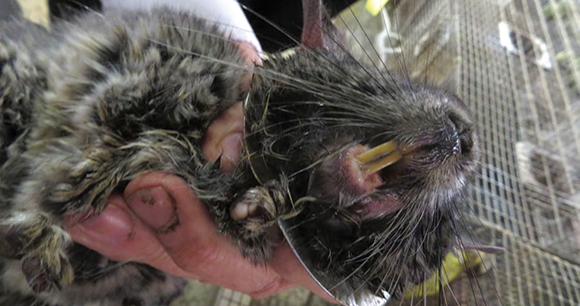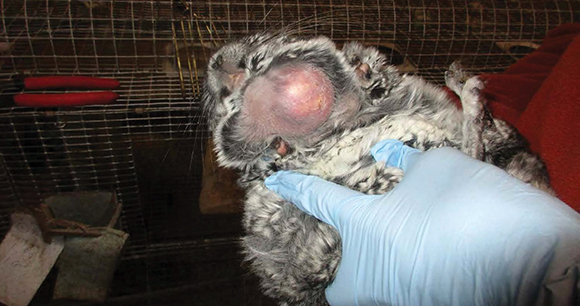On October 8, US Department of Agriculture administrative law judge Jill Clifton permanently revoked the dealer license of Daniel Moulton, who for decades had been a primary supplier of chinchillas for experimentation (see AWI Quarterly, fall 2021). The 18-day hearing further revealed just how much the USDA and the research industry have enabled Moulton’s cruelty.

Judge Clifton called his violations “absolutely astounding” and repeatedly expressed her disbelief about Moulton’s record and callous disregard for animal welfare. Commenting on the person Moulton presented as his “attending” veterinarian, the judge said: “I’m very concerned if you regard Dr. Peeters as your attending [veterinarian]. He doesn’t have time to be … as was demonstrated in this hearing” (said, presumably, because Dr. Peeters performed surgery during his remote testimony). “He said he had not read the veterinary plan, and he said he had not read the chapter in the book, latest edition, which he has in his office that relates to chinchillas. These are fire alarms to me. Were they to you, Mr. Moulton?”
The USDA knew about Moulton
On just the second day after the USDA rested its case in chief, Judge Clifton said, “There is a strong likelihood that Mr. Moulton’s license will be revoked.” The USDA’s evidence, gathered from 2013 to 2017, after all, was overwhelming. She repeatedly overruled Moulton’s objections to multiple USDA inspectors testifying about the horrendous conditions. After Moulton objected to the testimony regarding repeated failed attempts to inspect because he was not available, Judge Clifton told him she was “particularly shocked” that he did not see the relevance and noted that the multiple attempted inspections alone were enough to warrant license revocation.
On the first full day of testimony, veteran inspector Brenton Cox—discussing inspections from 2014—stated that Moulton Chinchilla Ranch (MCR) was the worst facility he had ever seen, that it gave him nightmares, and that he used MCR as a training tool for what not to be. Later in the hearing, Judge Clifton asked Moulton, “In 2014, doesn’t that look like a horrible living environment?” He responded, “Yes.”
Aaron Rhyner, DVM, the USDA’s assistant director of field operations, also said Moulton had the worst compliance history he had ever seen. The USDA’s expert witness, Laurie Gage, DVM, called the conditions at MCR “stunning,” “egregious,” and “atrocious.” Gage’s “egregious” comment was in reference to a particularly disturbing incident: According to the testimony of inspector Scott Welch, DVM, a chinchilla was found who was missing part of her leg. There was no record that the leg had been evaluated, and the stump was stuck in the cage wires—apparently not for the first time. As Moulton tried to free her, she was “letting out distress cries,” and then was “limp in his hands.” She was “skin and bones” and “not very responsive.” Welch was concerned she was in a state of “serious, severe suffering,” so he suggested that Moulton put her out of her misery. Moulton’s USDA-approved veterinary care program allowed him to kill chinchillas by breaking their necks, so that’s what he did, right in front of (as Moulton himself described them) “flabbergasted” inspectors. Welch said Moulton “twisted the neck, too, after practically ripping it apart.”

Gage testified that this particular chinchilla “resonated” with her, and that this unconscionable neglect seemed to be “a recurrent theme at this facility.” When she noted that this chinchilla “could’ve been stuck in the wire without any access to food or water for who knows how long?” Moulton objected and was overruled. Gage inadvertently issued a devastating indictment of the USDA’s inexcusable failure to confiscate animals living in such an abysmal state when she testified, “Every day that our inspectors have been present at this facility, there has been some kind of problem that has directly affected the health and welfare of these animals.” She lamented that “we’re only finding a fraction because we’re not there every day.”
At least since 2013, the USDA had known how things were at MCR. Yet the department never followed through on what their inspectors conscientiously recorded by confiscating a single chinchilla or notifying the Department of Justice (as mandated by the AWA once it determined that the chinchillas’ health was in serious danger). Since 2014, Moulton has racked up more direct citations (the most severe type of critical citation) than any of the other 10,000+ AWA-regulated licensees and registrants. The USDA documented direct citations every year from 2014 through 2021, including a 2018 announced inspection that found 22 chinchillas needing veterinary care. When Moulton asked if he was required to take a chinchilla with an eye infection to the veterinarian, Judge Clifton said, “Isn’t that an interesting statement. … I guess he’s saying, I never knew I was supposed to do that. That’s very interesting after all these years.”
During the hearing, Moulton repeatedly attacked the inspectors, prompting comments like “absolutely appalling,” “disgusting” and “slanderous” from the department’s attorneys. But where was this outrage and affirmation of the inspectors’ vital work years ago, when the department could have acted on their findings and saved so many chinchillas from this ongoing abuse? Instead, in 2019, the USDA actually helped Moulton with the paperwork to renew his license.
The research industry enabled Moulton
The USDA’s inaction over the years is not the only problem. For years, the American Association for Laboratory Animal Science (AALAS) Buyers Guide listed MCR as the only chinchilla supplier. In July, National Geographic described MCR’s enhanced ad in the vendor showcase of the guide, which touts reaching customers within the “trusted network” of AALAS. Before AALAS removed the ad weeks after the revocation, it was prominently featured on the Buyers Guide homepage. The textbook Laboratory Animal Medicine, published by the AALAS-affiliated American College of Laboratory Animal Medicine (ACLAM), also identifies MCR as the only chinchilla supplier.
Moulton told National Geographic that research is now his sole customer and that he had recently sold 30 chinchillas, with military installations inquiring about hundreds more. In 2010, Moulton told another ACLAM-published textbook that a research lab contacted him in 1975 looking for chinchillas and that, after that, he slowly converted the operation from fur farm to research vendor. By promoting and continuing to purchase from MCR, researchers have perpetuated the abuse of untold numbers of chinchillas.
Moreover, prominent research figures were actively involved in Moulton’s defense. A veterinary pathologist from the University of Minnesota testified for Moulton, as did a retired AALAS-certified lab animal technician who managed Southern Illinois University’s animal research facility and evaluated labs for the Association for Assessment and Accreditation of Laboratory Animal Care International.
Sanford Feldman, DVM, director of the Center for Comparative Medicine at the University of Virginia, also testified for Moulton and acted as his “technical advisor” at the hearing. Feldman has been at UVA for 24 years. He wrote the university’s guidelines for determining pain in animals and is responsible for ensuring that the university complies with the AWA. He also worked at the National Institutes of Health for five years, is an ACLAM Diplomate (consultant to other scientists), has presented at least 17 times at the annual AALAS National Meeting, and served as a reviewer for the Laboratory Animal Medicine textbook.
Last year, Feldman told Science that Moulton’s chinchillas are not “suffering terribly” and likened the violations to a speeding ticket for going 26 mph in a 25 mph zone. At the hearing, the USDA attorney asked him if an animal is “experiencing discomfort” if his “eyes are swollen shut.” Feldman responded, “It’s probably uncomfortable, but it may not be painful. If your life is in a cage and you can acquire your food and your water, then the fact that your eye is glued shut may not be a terrible thing.” And when the USDA attorney asked, “Is that a source of stress, to not be able to see?” Feldman answered, “They’re not blind when one eye is shut. … if I wake up in the morning during allergy season and my eye is crusted shut, me, I wipe the crust off. It’s not painful to me. It itches.” Feldman also testified that Moulton “has made and continues to make good-faith efforts to comply” with the AWA. He acknowledged, however, that Moulton gave him just 14 out of the 300 exhibits in the case and that he had never actually visited Moulton’s facility.
Conclusion
The entire situation is a fire alarm. Indeed, conditions at MCR have been a blazing, highly visible ten-alarm fire for years. The USDA knew. The research industry knew. Their willful failure to act perpetuated what the USDA itself called “immense, avoidable suffering” for countless chinchillas.
At press time, Moulton is not yet out of business; he can keep his license during the five months he has been granted (incredibly, via two extensions) to file an appeal. Moreover, after Judge Clifton adjudicated 213 willful violations of the AWA (and called them “absolutely astounding”), she fined him a mere $18,000—a fraction of what was called for. Meanwhile, a November inspection once again documented multiple direct citations as the chinchillas continue to suffer from lack of adequate veterinary care and staffing. As we wait to see whether Moulton appeals, the lives of nearly 700 chinchillas hang in the balance.